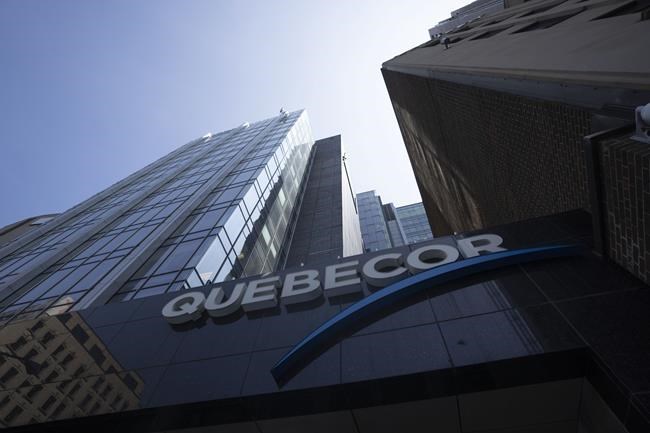Quebecor Inc. says it added more than 1.8 million subscribers through its purchase of Freedom Mobile as it began to unveil new offerings for customers following its entry to the national wireless market last quarter.
Chief executive Pierre Karl Péladeau said Thursday that in the four months since the $2.85-billion transaction closed, the Montreal-based telecommunications company has lowered prices across the country by increasing competition and delivering on commitments to Ottawa.
He said Quebecor's Videotron mobile service now reaches nearly 70 per cent of Canada’s population and will be able to further expand coverage by functioning as a mobile virtual network operator.
"We can't completely anticipate what will take place in the future, but this is certainly, where we are today, a different world and a different landscape," Péladeau told analysts on a call.
"You can anticipate that there's other things to come and it will be known in the marketplace in due time."
Videotron's purchase of Freedom Mobile from Shaw Communications Inc. was a condition of Rogers Communications Inc.'s takeover of Shaw to ease competition concerns surrounding the larger merger.
As part of a list of requirements laid out by Industry Minister François-Philippe Champagne, Videotron must offer plans that are at least 20 per cent lower than those of its competitors and spend $150 million to upgrade Freedom Mobile’s network.
Freedom announced in May it would offer a $50 monthly plan, its first with national coverage, that includes unlimited calls and texts as well as 40 gigabytes of data usable throughout Canada and the U.S.
In late July, the carrier revealed it was adding 5G capability for customers with plans that cost $45 per month or more in the Toronto, Vancouver, Calgary and Edmonton areas along with select cities across Ontario, B.C. and Alberta.
It added it is planning 5G rollouts in other markets that are still to come. The company said Thursday it will also unveil more bundling options for customers subscribed to multiple services in the weeks and months ahead.
Chief financial officer Hugues Simard said the company was pleasantly surprised after taking over Freedom "with how advanced they were in terms of almost being ready to turn 5G on in many markets."
"A lot of that investment had already been made, so we made the rest this quarter, and were in a position to launch in the main markets," he said.
Quebecor's purchase of Freedom drove a big boost in earnings last quarter as it reported that net income climbed 10 per cent to $171.3 million in the three months ended June 30 from $156.3 million in the same period a year earlier.
Quebecor said revenues in its second quarter jumped 25 per cent to $1.40 billion from $1.12 billion the year before. On an adjusted basis, income from continuing operations rose to 79 cents per share last quarter compared to 68 cents per share a year prior, beating analyst expectations of 72 cents per share.
It said its telecom segment, which accounts for 86 per cent of revenue, drove the company's leap in revenue, more than offsetting losses at its cable division.
The vast majority of the company's 1.8 million new subscribers through Freedom are mobile phone customers, doubling that total to 3.6 million. Quebecor also added 20,000 subscriptions to its internet service from the deal.
Quebecor's wireless mobile phone average revenue per user was $37.77, down $1.17, or three per cent, from the second quarter of the prior year, mainly due to a change in the customer mix.
RBC analyst Drew McReynolds said the results "were largely in line" with forecasts and that there were "minimal surprises given all of the moving parts following the acquisition of Freedom Mobile."
"We view results as largely neutral for the shares at current levels," he wrote in a note.
While Péladeau touted his company's work to "reinvigorate the competitive dynamics in Canada" since the Freedom purchase, he said regulatory support is needed to ensure it continues to succeed.
He praised the CRTC's ruling last month in a final offer arbitration proceeding between Quebecor and Rogers, which was requested by the companies just days after Videotron acquired Freedom.
While Quebecor and Rogers had agreed on certain rates that Videotron would pay to Rogers when offering services using its wireless network, they had been unable to reach a deal on data rates. The CRTC sided with Quebecor's ask and directed both sides to enter into an access agreement so that Videotron "can expand competitive mobile wireless services to Canadians as quickly as possible."
"The decision indicates that the CRTC and its new leadership are committed to increased competition in Canada's telecom industry, while encouraging network investments," Péladeau said.
"The rates selected by the CRTC, which are in line with international rates, will enable Quebecor and its subsidiaries to offer plans that are more affordable, accessible and competitive across Canada to the benefit of consumers."
This report by The Canadian Press was first published Aug. 10, 2023.
Companies in this story: (TSX:QBR.B, TSX:RCI.B)
Sammy Hudes, The Canadian Press




